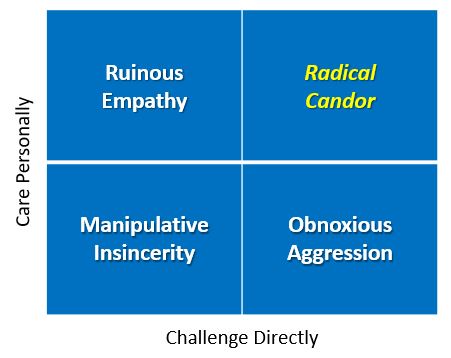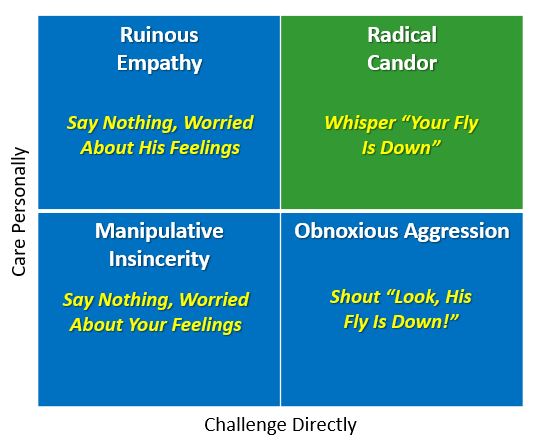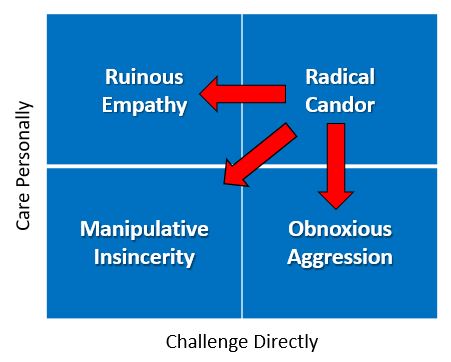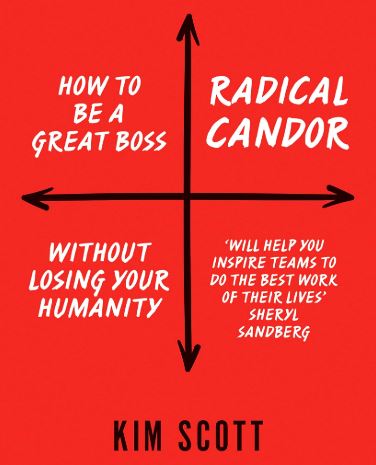Executive Summary
Radical Candor is a book by Kim Scott that chronicles the trials and tribulations of her management journey. Scott outlines a framework for engaging candid conversations with employees and peers. She does a great job of highlighting the importance of delivering candid guidance (both praise and criticism) to employees. If you’re a process-driven business leader or department head, you will love the simplicity of this employee relationship building framework.
In simple terms, approaching employee relationships using Radical Candor will:
- Build trust with employees
- Open the door for good communications with teams
- Create more job satisfaction and less misery for employees
- Help you praise or criticize employees on a specific situation, rather than judging their character or personality
Thank you, Kim Scott, for sharing this framework with the world! The remainder of this post provides insight into Radical Candor. It also provides instructions on “how to” implement Radical Candor in teams and small companies.
“There is a straight line from a lack of candid guidance to a dysfunctional team.”
The Managerial Situation
Scott opens Radical Candor with a series of stories about situations she faced as a manager. Most of her stories hit home with me. For example. Have you ever experienced a managerial situation where you:
- Had an employee that wasn’t getting the job done
- Liked the employee
- Didn’t want to come down hard on their poor performance
- Gave the employee false praise, rather than criticism
- Couldn’t bring yourself to address the problem
- Started to avoid the employee
- Witnessed other employees being friendly, but not candid with the employee to their face
- Ended up firing the employee
- Were confronted by the employee for not telling them about their poor behaviors and/or performance
- Left the employee wondering why no one at work cared enough about them to tell them
If your answer is yes, then keep reading – – you will find value in Radical Candor.
Why Do Managers Side-step Difficult Conversations?
Generally speaking, managers focus on getting things done. At the same time, they want to get along with employees and want employees to get along with each other. To this end, many managers avoid tough conversations with employees
- Don’t want to be viewed as a bad person
- View these conversations as a distraction and/or a waste of time
- Are not sure what to say and how to say it
- Fear an angry response from employees
- Don’t want employees to feel like they are being used, or are pawns in a political game
- Are worried that employees will break down and cry if confronted
- Make assumptions about why employees are not performing i.e. they are distracted by something at home
- Believe that it would take too long to teach employees, so you do it themselves
- Concerned that other employees will think they’re a jerk
“As A Manager, It’s Your Morale Obligation To Give Guidance To Employees – – Both Praise and Criticism”
The Consequences of Not Addressing Poor Performance and Behaviors
By ignoring poor performance and behaviors, managers are setting the stage for two frustrating consequences. The first is that under-performing employee conclude that:
- Everything is OK, so they keep doing what they’ve been doing
- Their performance is good enough
- There is no incentive to try harder and perform better
The second is that other employees conclude that managers:
- Will accept poor performance and behaviors
- Are not working with their best interest in mind
- Do not know the difference between great and mediocre performance
Both consequences waste time, money, morale, and careers.
What Are The Key Responsibilities of a Manager?
Before digging further into Radical Candor, let’s step back for a moment to make sure that we’re on the same page. Managers have two primary responsibilities. They are responsible for getting results by proactively managing:
- Processes through policies, procedures, and metrics including
- Strategy– forecasting, planning, organization structure, and culture
- Execution– procedures, technology, and information
- Evaluation– tracking, analyzing, reporting, and process improvement
- People through strong working relationship by providing:
- Guidance – praise, criticism
- Motivation – career goals, life dreams
- Collaboration – communication, teamwork
Radical Candor is a framework for managing people by building strong working relationships. It does this by creating an environment were managers and employees give each other candid praise and criticism. Strong manager/employee working relationships enable work processes to be executed with greater precision – – effectiveness, efficiency, and predictability.
“The heart of being a good boss is a great relationship with each employee”
What Blocks Managers and Employees From Having Great Relationships?
Scott talks at length about what creates bad and good manager/employee relationships. In simple terms, employees struggle to have a good working relationship when their manager:
- Acts With A Sense of Superiority
because - Want power
- Fear conflict and angry responses
- Don’t understand how to manage work-life balance
- Fear losing credibility
- Are under pressure to get work done, not socialize
- Does Not Ask For Feedback because they:
- Are afraid of what they’ll hear
- Feel ashamed that they are not doing a better job as a manager
- Think other managers are doing a better job
- Just don’t want to know
- Get defensive when people give them feedback
- Do Not Push Decisions Downward to employees
because - Find it easier and quicker to just do the work themselves
- Don’t want to impose on other people
- Are afraid to give up control – – fear of losing their job
- Want to avoid creating tension or discomfort
- Want to ensure that everyone gets along
How Can Managers Build Strong Working Relationships With Employees?
Scott reminds us that to build strong working relationships with employees, managers need to:
- Create clear and measurable job responsibilities
- Provide step-by-step instructions
- Challenge employee behavior while praising their character
- Ensure that every employee knows where they stand
- Craft opportunities for people to grow professionally
- Give candid guidance to employees i.e. praise and criticism
“Caring Personally Is The Antidote To Robotic Professionalism and Managerial Arrogance”
How Should Managers Provide Candid Guidance To Employees?
This is where the Radical Candor framework comes into play. Scott highlights that there are two dimensions that managers need to focus on when delivering guidance (praise and criticism) to employees: 1) care personally, and 2) challenge directly.
When properly executed, radically candid praise and criticism helps managers:
-
Build trust with employees
-
Open the door for good communications with teams
-
Create more job satisfaction and less misery for employees
-
Focus on specific situations, behaviors, and words, rather than judging their employees character

Radical Candor Quadrants
Scott defines four quadrants when delivering guidance to employees:
- Radical Candor where the manager challenges directly and cares personally
- Ruinous Empathy where the manager cares personally but does not challenge directly
- Obnoxious Aggression where the manager challenges directly but does not care personally
- Manipulative Insincerity where the manager neither cares personally or challenges directly
A Funny Example
To help drive the point home, Scott provides a funny example of how the four quadrants work. Here’s an abbreviated version of the story.
A man is about to give a presentation and you notice that the zipper on his pants is down i.e. his fly is open. How would handle the situation?
This graphic drives the point home.

“People Would Rather Work For A Competent Asshole Than A Nice Incompetent Manipulator.”

What Happens When Managers Make A Mistake?
Scott highlights that when managers make a mistake they tend to become:
- Less genuine
- More defensive
- Politically sensitive
- Less open
In simple terms, managers abandon Radical Candor when they make a mistake. They retreat into one of the other three quadrants. None of which bode well for manager/employee relationship building.
So, the Radical Candor framework can help managers maintain awareness of their feelings, words, and behaviors. It helps them focus on the relationship.
Five Steps For Implementing Radical Candor
Step 1 Provide An Overview To Your Direct Reports to get them on the same page. Teach them how to use the Radical Candor framework to provide guidance (praise and criticism) to you, their peers, and their direct reports.
Step 2 Ask For Employee Feedback to improve your awareness of how you are perceived. Ask them to share their perception of which quadrant you most frequently operate in. Your employees will be hesitant at first. But keep asking them for feedback. Reminder – do not react negatively to their feedback.
Step 3 Schedule Time With Your Direct Reports to get to know them beyond work. Try to understand their life outside of work while being sensitive to their personal situation. Identify their career ambitions and dreams. Share your personal life with them, within reason. Let them into your career ambitions and dreams.
Step 4 Use The Framework In Meetings to help you and your employees stay focused. Use the framework to reduce the temperature when conversations heat up. Critique each
Step 5 If Necessary, Hire An Outside Coach to help you and your team build Radical Candor into your work routines, interactions, and meetings.
“Yes, It’s True That Many Bosses Are Robotic Dream Killers. Using Radical Candor Can Help Them Drive Results And Bring Dreams To Life.”
Some Final Tips For Building Relationships With Your Employees
Here are some final tips for building relationships with your employees. Managers should:
- Be humble, helpful and do not make assumptions about employee’s
- Challenge employees with respect and encourage them to do the same with you
- Embrace and celebrate conflict, do not avoid it
- Seek to understand their
employees perception of them - Use Radical Candor for things that really matter, not for trivial stuff
- Work to be intellectually honest about both sides of an argument
- Care deeply for employees and be prepared to be hated for it
- Give employee guidance on specific behaviors and performance, do not judge their character
- Communicate clearly to avoid
mis-interpretations
Please Take a Minute To:
- Write a comment on this post
- Click Here to learn more about Chief Sales Leader Advisers
- Share this blog with other sales leaders, salespeople, CEO’s and investors
It’s time to bring precision – – effectiveness, efficiency, and predictability – – to sales execution.

